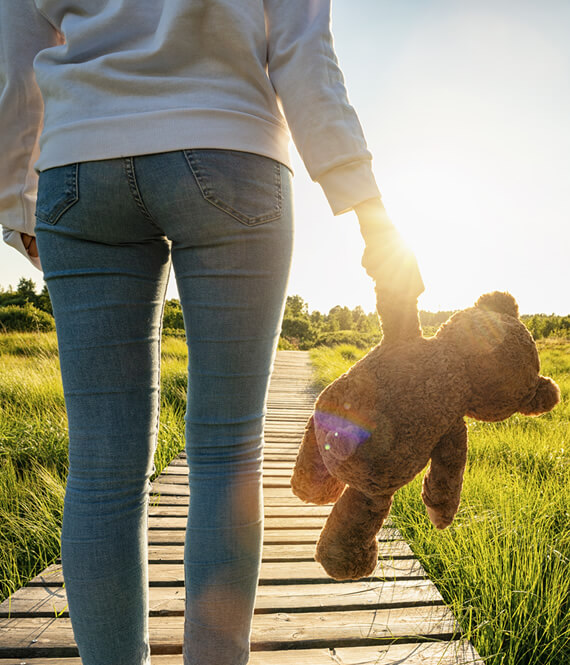
What Is Childhood Trauma? (And How to Heal It)
We recommend helpful products in our articles. Read our full disclosure here. The content on this website is not intended to be a substitute for professional advice, diagnosis, or treatment.
Childhood is a special time in our lives when we ought to feel safe and loved.
In fact, our childhood experiences can influence our health and success as adults.
For some kids, unfortunately, they become victims of abuse, neglect, and other forms of physical and psychological violence — which have long-term consequences.
Whether you’re looking to learn more about childhood trauma or are trying to help yourself or someone you know heal, let this article be your guide.
Below, we discuss what childhood trauma means, its negative effects on a person’s life, and helpful ways to heal.
Childhood Trauma: Definition, Causes, and Consequences
Childhood trauma refers to an overwhelming event that’s emotionally painful to a child and may put their lives at risk.
There are many causes of childhood trauma, but common ones include:
- Bullying (in person or online)
- Witnessing violence in your environment
- Getting into an accident
- Having parents or caregivers who are seriously ill, addicted, or going through a divorce.
In extreme cases, childhood trauma results from sexual abuse, regular physical punishment, and commercial exploitation.
According to the US Department of Veterans Affairs, “15% to 43% of girls and 14% to 43% of boys go through at least one trauma.” The more severe the trauma, the more likely these kids are to get post-traumatic stress disorder (PTSD).
If not PTSD, trauma can result in or be associated with attention-deficit hyperactivity disorder (ADHD) symptoms, alcohol or drug dependency, low self-esteem, anxiety, depression, and anger issues.
How to Heal from Childhood Trauma
No matter how painful your childhood experience was, unresolved trauma can be healed.
Keep in mind that this healing process isn’t linear.
As you go through life, you may encounter situations that could undermine your progress and get you back to square one.
It’s important to see the bigger picture, be patient with yourself, and seek support.
Here are ways to start the healing process.
Talk to a mental health professional.
Therapists and psychiatrists are the right professionals to help trauma victims navigate and rationalize the events they’ve experienced.
One of these evidence-based treatments is trauma-focused cognitive behavioral therapy (TF-CBT), which teaches coping skills (for example, relaxation) and involves caregivers of the trauma victim in their recovery journey.
Part of your cognitive behavioral therapy intervention includes completing exercises at home that allow you to practice the skills you’ve learned during your therapy sessions.
Complying with your homework increases your success in CBT.
For those who don’t have access to a CBT therapist for personal reasons but they’re able to function generally well, the good news is that they can perform self-help in their own time using CBT-based resources.
These childhood trauma worksheets are some of the best resources they can try.
Acknowledge your trauma.
Burying or bottling up your emotions so you can “move on” actually hurts more than it heals you.
Confronting the trauma may be scary, but it’s the first step toward recovery.
Some people label this process as “acknowledging your inner child.” It involves paying attention to what the small voice inside of you is saying — and by doing so, you can work through your emotional pain.
Take, for example, this scenario: You and your best friend had planned to spend the weekend together.
But your friend suddenly canceled due to her work schedule.
While you know this is true, you felt lonely and rejected but then brushed these feelings aside to avoid drama.
In these moments, it’s essential to be fully aware of your emotions and accept them as valid.
Then, reflect on how these emotions are affecting your life, especially if they’re becoming a pattern.
Instead of allowing yourself to continue feeling helpless, explore healthy ways to cope.
We recommend some tips below.
Do journaling as a daily habit.
Journaling is therapeutic, plus it can be done anywhere.
Aside from providing you with a way to express yourself, it allows you to understand yourself better and prompts you to figure out the next step to solve your problem.
If you’re completely new to journaling, don’t worry.
Begin by giving yourself permission just to write down whatever it is that you’re thinking and feeling.
You could write something like, “Today, it rained hard, and then I started having flashbacks of [traumatic experience].” This is a simple journaling prompt that lets you identify the trauma trigger (the weather) that brought back the traumatic memory.
As a helpful exercise, write down the things you’re currently doing to cope and new strategies that you’d like to try that you believe will make you feel better!
For example, meditating at the beginning of each day and complimenting yourself.
These are just a few ways to heal and practice self-love!
Recognize the good things in your life.
Childhood trauma survivors can benefit from gratitude, which means showing appreciation for what you currently have.
Gratitude doesn’t come easy when you’re preoccupied with negative thoughts and memories, but research shows that gratefulness gives meaning to the lives of traumatized individuals.
It allows them to embrace life as a gift and be open to opportunities.
Try this simple exercise: Start and end each day by spending 5 minutes thinking about a gratitude thought.
Here’s something you can use — “Some days may be difficult, but I am making a conscious decision to seek joy and peace.
And for that, I am grateful.”
Savor this moment of gratitude.
While reciting this affirmation, focus your attention on the positive things you see, hear, and feel.
Keep in mind that gratitude doesn’t get rid of all the bad memories, but it plays a huge part in helping you improve over time by dwelling on the positive aspects of life.
The Bottom Line
These are a few of the many things you can do to heal from unresolved childhood trauma.
Although your experience of loss, abuse, neglect, or violence is technically in the past, it may have a serious impact on your mental health.
Adult survivors of childhood trauma should know that they don’t have to struggle with its effects for the rest of their lives.
With therapy and self-help techniques at their disposal, they’ll be able to move forward.
"We love to research problems, examine studies, analyze solutions, and share with you ideas that make life healthier. You can learn about us and our editorial standards here. Have suggestions or feedback to share? Send us a message!."













Leave a Comment